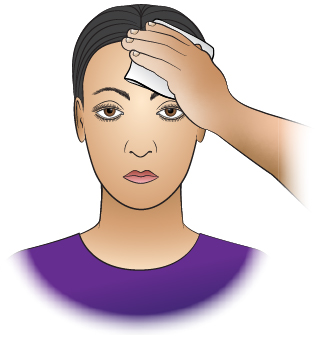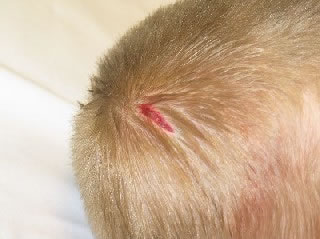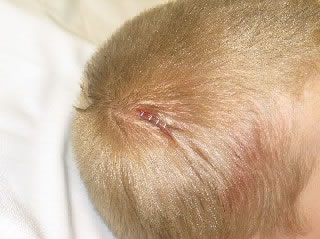Head Injury
Is this your child's symptom?
- Injuries to the head
- Includes the scalp, skull and brain
Types of Head Injuries
- Scalp Injury. Most head injuries only damage the scalp. Examples are a cut, scrape, bruise or swelling. It is common for children to fall and hit their head while growing up. This is especially common when a child is learning to walk. Big lumps (bruises) can occur with minor injuries. This is because there is a large blood supply to the scalp. For the same reason, small cuts on the head may bleed a lot. Bruises on the forehead sometimes cause black eyes 1 to 3 days later. This is caused by blood spreading downward by gravity.
- Skull Fracture. Only 1% to 2% of children with head injuries will get a skull fracture. Most often, there are no other symptoms except for a headache. The headache occurs at the site where the head was hit. Most skull fractures occur without any injury to the brain. They heal easily.
- Concussion. A concussion is a type of brain injury. It causes a change in how the brain works for a short time. It is usually caused by a sudden blow or jolt to the head. Most children bump or hit their heads without causing a concussion. The most common signs are a brief period of confusion or memory loss. This happens after the injury. Other signs of a concussion can include a headache or vomiting. Dizziness or acting dazed can also be signs. A person does not need to be knocked out to have had a concussion. Following a concussion, some children have ongoing symptoms. These can include headaches, dizziness or thinking difficulties. School problems or emotional changes can occur. These symptoms can last for several weeks.
- Brain Injuries (Serious) are uncommon. This includes bleeding, bruises or swelling within the brain. They are suspected by the symptoms listed below:
- Hard to wake up or keep awake or
- Acts or talks confused or
- Slurred speech or
- Weakness of arms or legs or
- Walking is not steady.
- These symptoms are an emergency. If they happen, call 911.
Concussion Treatment
- Treating a concussion requires both Physical Rest and Brain Rest.
- Brain rest means a gradual return to full studying and school attendance.
- Physical rest means a gradual return to normal activity, work and gym class.
- If symptoms occur (like a headache), the child needs to return to the previous level of physical and mental activity. In 24 hours, they can try again to take it to the next level.
- Athletes involved in sports need to have a stepwise plan for "return to play." Progressing through stages should be supervised by a doctor or athletic trainer.
Pain Scale
- Mild: your child feels pain and tells you about it. But, the pain does not keep your child from any normal activities. School, play and sleep are not changed.
- Moderate: the pain keeps your child from doing some normal activities. It may wake him or her up from sleep.
- Severe: the pain is very bad. It keeps your child from doing all normal activities.
When to Call Us for Head Injury
Call 911 Now
- Seizure occurred
- Knocked out (unconscious) for more than 1 minute
- Not moving neck normally. Caution: protect the neck from any movement.
- Hard to wake up
- Acts or talks confused or slurred speech present now
- Walking not steady or weakness of arms/legs present now
- Major bleeding that can't be stopped
- You think your child has a life-threatening emergency
Call Doctor or Seek Care Now
- Age less than 1 year old
- Knocked out (unconscious) for less than 1 minute
- Skin is cut and No past tetanus shots. Note: tetanus is the "T" in DTaP, TdaP, or Td vaccines.
- Skin is split open or gaping and may need stitches
- Bleeding that won't stop after 10 minutes of direct pressure
- Large swelling (larger than 1 inch or 2.5 cm)
- Large dent in skull
- Blow from hard object (such as a golf club)
- Fall from a dangerous height
- You think your child has a serious injury
- You think your child needs to be seen, and the problem is urgent
Contact Doctor Within 24 Hours
- Headache lasts more than 24 hours
- Dirty cut or hard to clean and no tetanus shot in more than 5 years
- Clean cut and no tetanus shot in more than 10 years
- You think your child needs to be seen, but the problem is not urgent
Contact Doctor During Office Hours
- You have other questions or concerns
Self Care at Home
- Minor head injury
Care Advice for Head Injuries
What You Should Know About Mild Head Injuries:
- Most head injuries only cause a swelling or bruise to the scalp.
- The main symptom is pain.
- Swelling of the scalp does not mean there is any swelling of the brain. The scalp and brain are not connected. They are separated by the skull bone.
- The skull bone protects the brain from getting injured.
- Big lumps or bruising can occur with minor injuries to the scalp. This is normal. Reason: the scalp has a large blood supply.
- The mildest brain injury is a concussion. Most of those also turn out fine.
- Here is some care advice that should help.
Wound Care:
- If there is a scrape or cut, wash it off with soap and water.
- For any bleeding, put direct pressure on the wound. Use a gauze pad or clean cloth. Press for 10 minutes or until the bleeding has stopped.
Cold Pack For Swelling:
- Use a cold pack or ice bag wrapped in a wet cloth. Put it on any swelling. Do this for 20 minutes.
- Reason: prevent big lumps ("goose eggs"). Also, helps with the pain.
- Repeat in 1 hour, then as needed.
Watch Your Child Closely for 2 Hours:
- Watch your child closely during the first 2 hours after the injury.
- Have your child lie down and rest until all symptoms have cleared. Note: mild headache, mild dizziness and nausea are common.
- Allow your child to sleep if he wants to, but keep him nearby.
- Wake him up after 2 hours of sleeping. Check that he is alert and knows who you are. Also, check that he can talk and walk normally.
Diet - Start With Clear Fluids:
- Offer only clear fluids to drink, in case he vomits.
- Allow a regular diet after 2 hours.
- Exception: babies can continue breastfeeding or formula.
Pain Medicine:
- To help with the pain, give an acetaminophen product (such as Tylenol). Another choice is an ibuprofen product (such as Advil). Use as needed.
- Exception: do not give until 2 hours have passed from injury without any vomiting.
- Caution: never give aspirin to children and teens. Reason: always increases risk of bleeding.
Special Precautions For 1 Night:
- Mainly, sleep in same room as your child for the first night.
- Reason: if a problem occurs, you will recognize it if you are close by. Problems include a bad headache, vomiting or confusion. Also, look for any change in your child's normal behavior.
- Option: if you are worried, wake your child once during the night. Check how he walks and talks.
- After 24 hours, return to a normal sleep routine.
What to Expect:
- Most head trauma only causes a scalp injury.
- The deep headache usually clears in 24 hours.
- The scalp pain at the site of impact may last 3 days.
- The swelling may take a week to go away.
Call Your Doctor If:
- Pain or crying becomes severe
- Vomits 2 or more times
- Your child becomes hard to wake up or confused
- Walking or talking is not normal
- Headache lasts more than 24 hours
- You think your child needs to be seen
- Your child becomes worse
Remember! Contact your doctor if you or your child develop any "Contact Your Doctor" symptoms.
Disclaimer: this health information is for educational purposes only. You, the reader, assume full responsibility for how you choose to use it.

First Aid - Bleeding Head
- Apply direct pressure to the entire wound with a sterile gauze dressing or a clean cloth. Once the bleeding has stopped, cover with an adhesive bandage or gauze.

Laceration - Scalp
This scalp laceration (cut) is gaping open. It will require closure with sutures or medical staples.
First Aid Care Advice:
- Apply direct pressure for 10 minutes to stop any bleeding.
- Wash the cut with soap and water.

Laceration - Scalp (After Staples)
This photo shows a scalp laceration after it has been closed with 4 metal medical staples.
Copyright 2000-2025 Schmitt Pediatric Guidelines LLC.